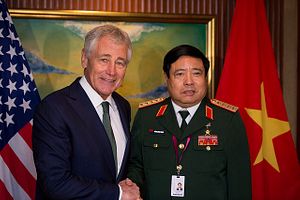As Vietnam continues to seek improved ties with the West, Hanoi has released its most prominent blogger Nguyen Van Hai, also known as Dieu Cay, who had been jailed for 12-years for disseminating anti-state propaganda.
Hai immediately flew to the United States, which regards him as a prisoner of conscience. The 62-year-old writer was among the first Vietnamese critics to target China and its maritime ambitions in the South China Sea while advocating democratic change at home.
Reports says his release also followed talks between U.S. Senator and Vietnam war era PoW John McCain during a visit in August, when tensions between Hanoi and Beijing were being ratcheted-up by China’s deployment of an oil rig into Vietnamese waters.
His plight also won the attention of U.S. President Barack Obama, who raised the subject with Vietnamese President Truong Tan Sang during talks in Washington last year.
His initial arrest was part of a crackdown on political activists, bloggers, journalists, lawyers, Buddhists, and the Christian clergy over the last two years as the Vietnamese economy went into deep recession amid mounting anger at the government and excessive corruption.
In calling for his release the U.S. had also noted that his treatment was inconsistent with Vietnam’s obligations under the International Covenant on Civil and Political Rights, as well as the provisions of the Universal Declaration of Human Rights relating to freedom of expression and due process.
Hai staged hunger strikes and spent months in solitary confinement in what human rights groups have dubbed the “world’s third biggest prison” for bloggers.
Nevertheless, he has vowed to return home, where his stance on China has won him support among ordinary Vietnamese and members of the ruling Communist Party who rely on bloggers for independent information in a country where the press remains heavily censored.
Hai’s freedom could also help the Vietnamese government and its struggle with China in what Hanoi calls the East Sea. Tensions leading to a naval stand-off have subsided in recent months amid the current the typhoon season.
“I would like to express my thanks to everyone for their … efforts to free me and other dissidents from prison,” Hai told reporters on his arrival in Los Angeles.
He said he was delighted by the welcome he received in the U.S., adding that other dissidents should know that they are not alone.
“Through a stronger connection with the media, people in prison still can protect themselves,” he said. This remark was widely interpreted as meaning outside pressure on the Vietnamese government had helped win his freedom.
Hai also vowed to continue his work to bring democracy to one-party communist Vietnam, where dissent is not tolerated. His release was applauded by human rights activists.
“The Vietnam government severely persecuted him for years because he was brave enough to voice his opinions and tell inconvenient truths that leaders in Hanoi didn’t want spreading via the internet among the Vietnamese people,” said Phil Robertson, deputy director of Human Rights Watch’s Asia division.
“They should not receive applause for forcing him into exile as the price for his freedom.”
Hai’s release also coincided with a visit to Vietnam by Tom Malinowski, U.S. assistant secretary of state for human rights who is expected to discuss the importance of progress on human rights in improving U.S.-Vietnamese ties, at a time when Washington is trying to forge closer relations with Southeast Asia.
Earlier this month the U.S. partially lifted a decades old ban on weapon sales to Vietnam, to assist with maritime security. However, human rights groups have warned the West to be careful in rewarding Hanoi, noting another 26 bloggers are still under detention.
Luke Hunt can be followed on Twitter @lukeanthonyhunt
































